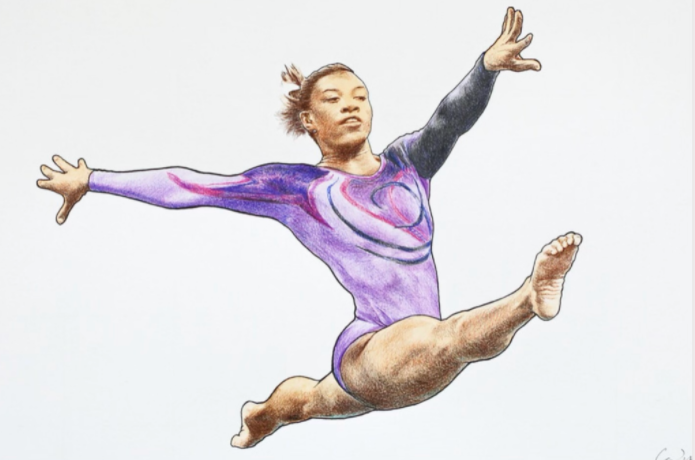No pain, no gain: How Simone Biles brought the conversation of mental health to the forefront
Credit: Courtesy of Flickr user Denish C
WSPN’s Emily Roberge discusses Simone Biles withdrawing from several of her Olympic events, and how her decision changed the conversation of mental health in sports.
September 2, 2021
The Olympics are always exhilarating: elite athletes represent their countries, competition unlike any other enfolds, fighting for the gold, and with the click of a TV remote, you can see any sport, any time. Despite no fans attending the 2020 Olympics due to COVID-19, the Tokyo Olympic Games represented something much more than sports- it offered a gateway into the discussion of mental health in athletics. Simone Biles, considered to be the one of the greatest gymnasts, brought light to her mental health struggles. As a role model for many, Biles addressed a conversation that is long overdue, as we need to take more steps to ensure that athletes’ mental health is taken into consideration.
In the 2020 Tokyo Olympics this summer, Biles stunned her fans and the sports world when she withdrew from the individual all-around, the team final, the finals for vault, floor and uneven bars to focus on her mental health. She competed solely in the balance beam finals, where she earned a bronze medal.
“Put mental health first, because if you don’t, then you’re not going to enjoy your sport, and you’re not going to succeed as much as you want to,” Biles wrote in a Tweet. “We also have to focus on ourselves because at the end of the day, we’re human, too. We have to protect our mind and our body, rather than just go out there and do what the world wants us to do.”
The risk of gymnastics:
Unlike other sports where athletes can brush themselves off for a missed goal, free throw or shot, gymnastics requires complete concentration. If a gymnast isn’t completely focused, they could break their neck or seriously injure themselves. Gymnasts get one pass, one routine and one try. This is made no easier when gymnasts experience the “twisties,” a disconnection between gymnasts’ mind and body when they are soaring in the air. When this happens, gymnasts don’t know exactly where they are in the air, unable to plan out how many times they have twisted.
“[I] literally can not tell up from down,” Biles said, calling it “the craziest feeling ever.”
Jordyn Webber, a gymnast on the 2012 London Olympics gold medal team says that this feeling is common.
”It’s something all gymnasts experience one time or another,” Webber said.
Ignoring mental health and internal struggles can have serious implications on anyone, especially gymnasts.
What it takes to be at the top:
Athletes must push themselves to certain extremes. Simone Biles didn’t get to her highest performance relying solely on her talent. As cliché as it may seem, elite athletes put blood, sweat and tears into their training to be the best. Biles has a strict training regimen, working out six hours a day, for two sessions a week every Monday, Tuesday, Wednesday and Friday. Every Thursday and Saturday are her “half-in days,” while her Sundays are spent resting, preparing for the next week.
The reality:
It’s no surprise that the most talented athletes must push themselves beyond their limits, as competition in their sport is continuously increasing. Athletes must endure some of the most gruesome physical pain and possess a certain amount of “mental toughness.” No one is taught to just quit when something gets hard, but there is a fine line between hard work and unbearable pressure and pain.
Imagine you are one of the greatest athletes of all-time competing in the Olympic games. You become the poster child for your sport, everyone knows who you are. Your fan-base increases, aspiring athletes begin to idolize you and the spotlight is always on you. Your country expects you to bring home the gold medal and maintain your title as the “Greatest of All Time.” Although this sounds thrilling and like every athlete’s dream, it has its drawbacks. It feels like the weight of your nation is on you, if you don’t remain victorious, you are ultimately disappointing not only your country, but your own self. It allows you to think you are only valued for your achievements and accomplishments in the sport, and nothing else that you might have to offer.
As Nadia Comaneci, an Olympic five-time gold medalist gymnast, adds to the conversation over pressure.
“The more medals you have, the heavier the backpack is,” Comaneci said.
All the normal struggles that go into the Olympics were worsened considering the turmoil in Bile’s personal life. During her time in Tokyo, Biles revealed she unexpectedly lost her aunt.
The response:
After withdrawing from most of the Olympics, Biles received an outpouring of support.
From Justin Bieber to Michelle Obama to Karl Anthony Davis Towns, many offered Biles words of encouragement.
“The outpouring of love and support has made me realize I’m more than my accomplishments, which I truly never believed before,” Biles said.
However, Biles’ decision was also met with criticism on Twitter. Piers Morgan, a British TV host and journalist known for his controversial opinions, tweeted his thoughts on the matter.
“Are ‘mental health issues’ now the go-to excuse for any poor performance in an elite sport,” Morgan said. “What a joke. Kids need stronger role models, not this nonsense.”
Other elite athletes struggles with mental health:
Biles is not alone. Naomi Osaka, a professional tennis player, recently withdrew from the French Open tennis tournament after being fined 15,000 dollars for skipping press conferences, to preserve her mental well-being.
“I communicated that I wanted to skip the press conferences at Roland Garros to exercise self-care and preserve my mental health,” Osaka said. “I stand by that. Athletes are humans.”
Osaka expanded her thoughts even more.
“I do hope that people can relate and understand it’s O.K. not to be O.K., and it’s O.K. to talk about it,” Osaka said.
Michael Phelps, one of the greatest swimmers of all time with 28 Olympic medals, follows his and other Olympians’ struggles during and after their careers in his documentary, “The Weight of Gold.”
“We’re just products,” Phelps said. “It’s frightening. It’s scary. And it breaks my heart. Because there are so many people that care about our physical being, but I never saw anyone care about our mental well-being.”
Biles isn’t the first, nor will she be the last.
“I think people finally understand that [mental illness] is real. People are talking about it, and I think this is the only way that can change,” Phelps said.
Biles, Osaka and Phelps join more than 35% of elite athletes experiencing mental health struggles.
When discussing mental health in athletics, we must also address the stigma that surrounds it. The expectation is that athletes need to be strong, tough and they can’t give up, which is, of course, true. Strong work ethic and determination are essential for anything. However, there should be no shame in athletes for being open about their struggles and prioritizing their mental health. No athlete should be branded a “quitter” or a “disappointment” when we don’t know what they are truly experiencing.
Eventually, an athlete’s career will come to an end: the rush of playing, the trophies and the constant spotlight will all be a distant memory. One thing that won’t change will be their internal struggles, and the importance of maintaining their mental health.
Biles has forever changed the conversation about mental health. This is just the beginning.





![Last Wednesday, the Wayland School Committee gathered to discuss a number of topics regarding the health curriculum and Innovation Career Pathway course. Another large topic of conversation was the ways to potentially mitigate distracting cell phone usage. "These [phones] are going to distract your learning and social relationships," Superintendent David Fleishman said. "That's concrete right there."](https://waylandstudentpress.com/wp-content/uploads/2025/06/Screenshot-2025-06-04-at-9.49.31 PM-1200x886.png)



























![Troy Hoyt finishes the Boston Marathon, running for the Hoyt Foundation. T. Hoyt is the son of Hoyt Foundation CEO Russ Hoyt.
“[Running a marathon] might seem like a big thing, when it’s presented to you at first, but if you break it up and just keep telling yourself, “Yes, you can,” you can start chipping away at it. And before you know it, you’ll be running the whole 26 miles, and you won’t even think twice about it.” T. Hoyt said.](https://waylandstudentpress.com/wp-content/uploads/2025/04/C36E8761-1CBB-452E-9DF2-543EF7B1095E_1_105_c.jpeg)













































